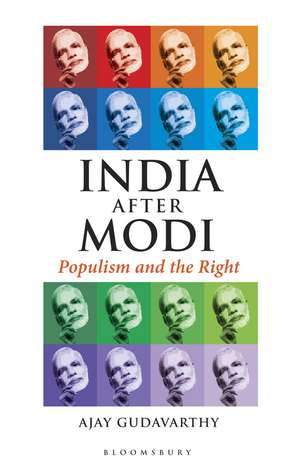India After Modi: Populism and the Right
Autor Ajay Gudavarthyen Limba Engleză Hardback – 17 noi 2018
Preț: 173.74 lei
Preț vechi: 236.71 lei
-27% Nou
Puncte Express: 261
Preț estimativ în valută:
33.25€ • 34.57$ • 27.55£
33.25€ • 34.57$ • 27.55£
Carte disponibilă
Livrare economică 15-29 ianuarie 25
Preluare comenzi: 021 569.72.76
Specificații
ISBN-13: 9789388038829
ISBN-10: 9388038827
Pagini: 266
Dimensiuni: 135 x 216 mm
Editura: Bloomsbury Publishing
Colecția Bloomsbury India
Locul publicării:New Delhi, India
ISBN-10: 9388038827
Pagini: 266
Dimensiuni: 135 x 216 mm
Editura: Bloomsbury Publishing
Colecția Bloomsbury India
Locul publicării:New Delhi, India
Caracteristici
Focuses exclusively on Indian democracy after Narendra Modi took over as the prime minister in 2014.
Notă biografică
Ajay Gudavarthy is Associate Professor at the Centre for Political Studies, Jawaharlal Nehru University, New Delhi. Earlier, he taught at the National Law School of India University, Bengaluru. In 2012, he had been Visiting Fellow, Centre for Citizenship, Civil Society and Rule of Law, University of Aberdeen. He was Visiting Faculty at the Centre for Human Rights, University of Hyderabad, in 2011, and Visiting Fellow, Goldsmith College, University of London, in 2010. Gudavarthy was the Charles Wallace Visiting Fellow (2008), the School of Oriental and African Studies (SOAS), London. His published works include Re-Framing Democracy and Agency in India: Interrogating Political Society (edited, 2012), Politics of Post-Civil Society: Contemporary History of Political Movements in India (2013), Maoism, Democracy and Globalisation: Cross-Currents in Indian Politics (authored, 2014), and Revolutionary Violence Versus Democracy: Narratives from India (edited, 2017).
Cuprins
I: POPULISM AND AUTHORITARIANISMIntroductionPopulist-Authoritarianism in India Populism and the Strongman: From Modi to Yogi Award Wapsi: Reasoning with IntoleranceWhy the RSS Projects JNU as Anti-National?Autonomy of Universities and a Life of the Mind Demonetization and the 'War on Terror' Corporate Capitalism, Hurt Pride, and Hindutva Populism and Mass Violence: The Liberal-Illiberal Dilemma Populism and Popular Culture: Are Muslims the Safest Enemy to Have?Hyper-Electoralism and Pakoda NationalismTheorizing Populism in IndiaII: STATE(S) OF DEMOCRACYIntroduction What Did BJP's Defeat in Delhi Tell Us?Does Bihar Hold the Key to the Future of Indian Politics?Populism and Caste Calculus in Uttar PradeshTelangana: The Question of Internal ColonizationKashmir: Is It Also a Question of Internal Colonization? Kashmiri Pandits: Precariats of Indian DemocracyOf What Value Is NOTA?Towards 2019: Opposition Needs to Rally Behind MayawatiBJP's Strategy for 2019III: DALIT-BAHUJAN POLITICSIntroductionAfter Rohith Vemula: Is the Dalit-Muslim Unity Sustainable?Dalit-Bahujans and Fraternity: From Ambedkar to Kancha IlliahUnity between the Left and the Dalit-BahujansCaste, Authenticity, and the Oriental SpiritIV: FUTURE OF POLITICSIntroductionNehru and the Rise of ModiBringing Justice Back In Women and the Future of DemocracyAnxiety, Anger, and Anomie: Mobilizing Generation NextIndia's Oscillating Public SphereSocial Ethics of Violence and the Maoist Movement in India
Recenzii
India after Modi does not merely condemn. It takes the job of a critique seriously by pointing out the many ways in which the BJP has offered numerous marginal as well as once-powerful but recently disempowered groups a fraternal space of recognition as Hindus. In a climate of generalized anxiety and rampant hatred, such people have been emboldened to seek vigilante justice by attacking Muslims as the safest enemy. Gudavarthy's book is complex and deeply disturbing.
This timely book diligently captures the qualitative kink in the history of postcolonial India with the help of various markers.a heady mix of European fascism and Indian Brahmanism.A must-read for all those who wish to understand the complex reality of contemporary India.
This book, which eschews mere moral condemnation of the Right in India to analyse its current ascendancy, and the corresponding stasis of the Left and Liberal forces, is a bold and imaginative work by a political theorist. No matter how one reacts to the author's arguments, they demand one's serious engagement.
In this timely and important book, Ajay Gudavarthy offers a compelling and critical commentary on Indian politics. The writing is engaging and jargon-free, and the analysis acute. Whilst titled India after Modi the book does not spare any political party. Rather, it offers sharp insights into the current state of Indian politics, how we got here, and where we might be headed. A must-read for all those wishing to understand the complex politics of the "world's largest democracy".
This timely book diligently captures the qualitative kink in the history of postcolonial India with the help of various markers.a heady mix of European fascism and Indian Brahmanism.A must-read for all those who wish to understand the complex reality of contemporary India.
This book, which eschews mere moral condemnation of the Right in India to analyse its current ascendancy, and the corresponding stasis of the Left and Liberal forces, is a bold and imaginative work by a political theorist. No matter how one reacts to the author's arguments, they demand one's serious engagement.
In this timely and important book, Ajay Gudavarthy offers a compelling and critical commentary on Indian politics. The writing is engaging and jargon-free, and the analysis acute. Whilst titled India after Modi the book does not spare any political party. Rather, it offers sharp insights into the current state of Indian politics, how we got here, and where we might be headed. A must-read for all those wishing to understand the complex politics of the "world's largest democracy".
